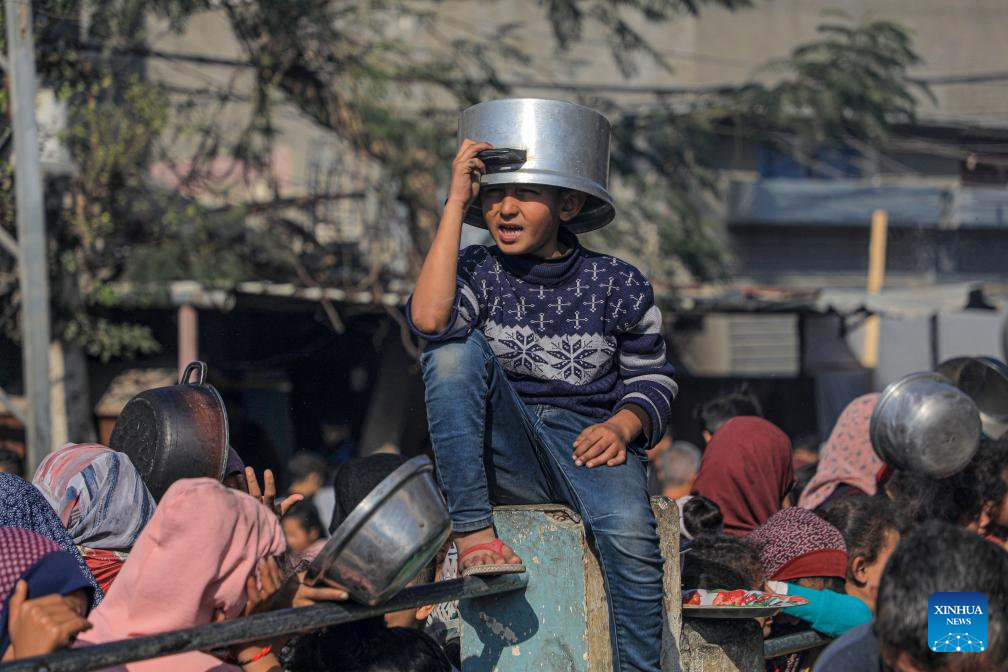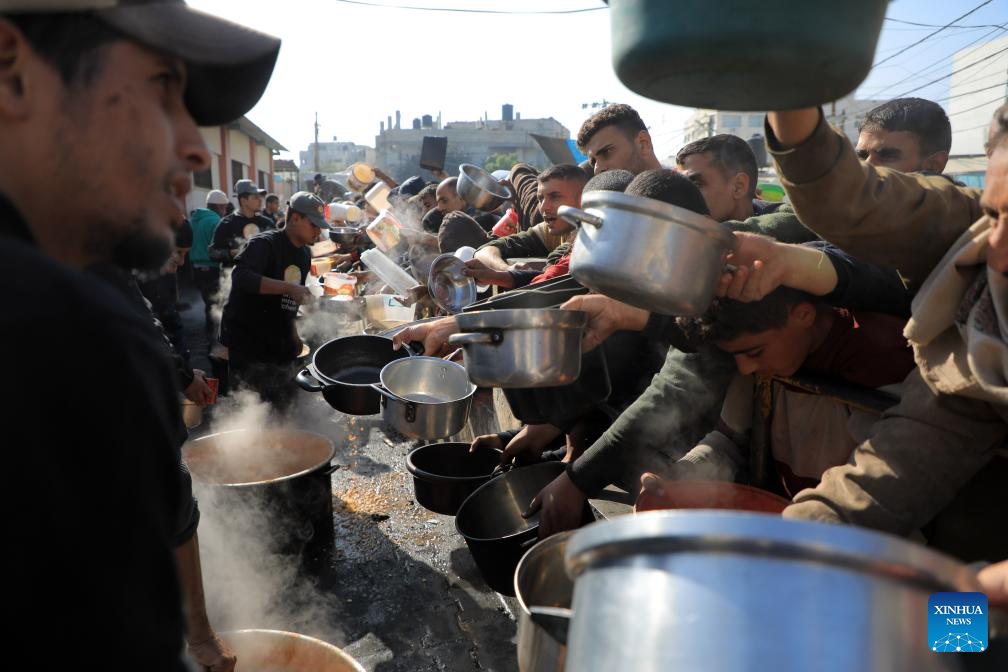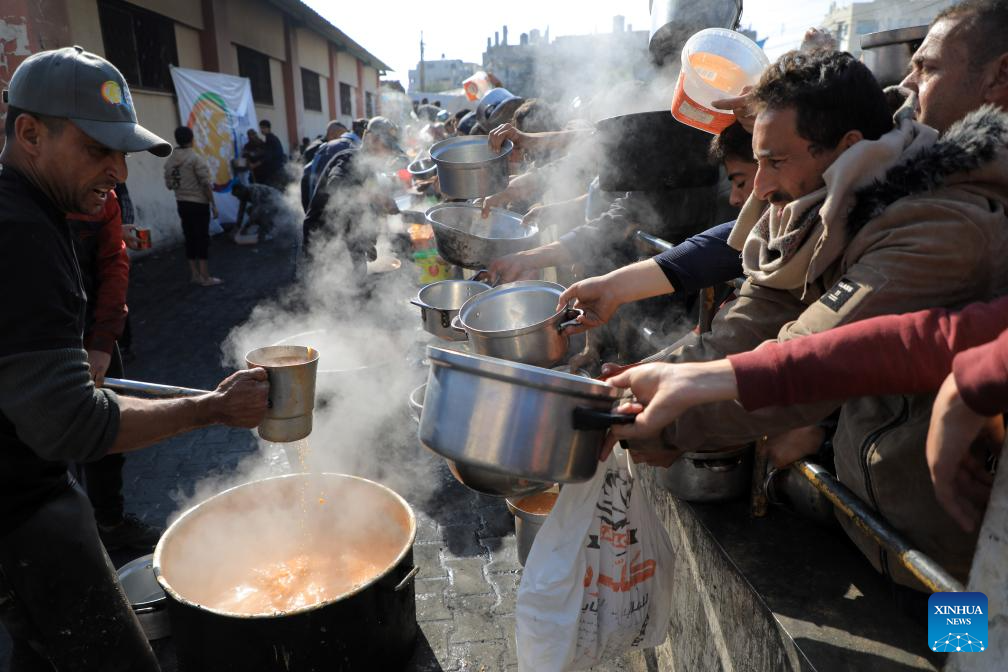
People gather to get food relief in the southern Gaza Strip city of Rafah, on Dec. 31, 2023. The United Nations (UN) estimates that approximately 1.9 million people in Gaza, or approximately 85 percent of the total population of the strip, have been displaced since the conflict broke out, while some of them were displaced several times to escape Israeli attacks and search for safe refuge. "Almost half of the population are starving and spending full days without eating," the UN Relief and Works Agency for Palestine Refugees said in a press statement, warning that more people could die from famine if the conflict continues. (Photo by Rizek Abdeljawad/Xinhua)
GAZA, Jan. 1 (Xinhua) -- Amid the ongoing Israel-Hamas conflict and the dire humanitarian situation in the Gaza Strip, Palestinians in the enclave still hold out the hope of returning to normal life in the new year 2024.
Shaimaa al-Yazgi, a 26-year-old mother of four, was forced to move 11 times with her family from one place to another for a narrow escape from death amid the persistent Israeli airstrikes.
"Sometimes, we were forced to run in the streets and hide ourselves in strangers' houses just to protect ourselves from the Israeli missiles," the Palestinian woman told Xinhua.
Keeping thinking positively about her family's risky journeys of displacement, al-Yazgi said, "When we survived each Israeli attack, I felt that we have golden luck, and this is what pushed me to keep my optimism that we will survive the current crazy war."
Currently, al-Yazgi lives in a temporary tent established in the western part of Rafah city in southern Gaza, facing an acute lack of water, food and electricity.
"I am only looking forward to resuming my life even if I still do not know what my fate would be," she said.
Not far away from her tent, Mohammed Abu Hamda, a displaced man from northern Gaza's Beit Lahia, sat on a chair and heard news broadcast through his mobile radio.
"All day, I am looking forward to catching good news about the ceasefire reached between Hamas and Israel," the 59-year-old father of nine told Xinhua.
"On such night," the elderly man recalled, "my daughters, sons, and grandsons used to visit me and celebrate the new year ... We used to eat cake and some sweets, wishing all of us a happy New Year."
Although being grieved that his life was turned upside down, as he lost his house, work, and everything in Gaza, the Palestinian man still hopes to return to his hometown and reunite with his family soon.
Mariam al-Jamali, a young Palestinian woman, also longed for the festive atmosphere she used to witness during the last day of each year.
"In previous years, I used to enjoy with my family the celebrations in the streets," the 25-year-old woman told Xinhua, complaining that "the general atmosphere is sad now. There are no lights on the streets, and people are only busy dealing with their daily suffering."
She expressed hope that a breakthrough would be made in talks to reach a truce that would allow all Gazans to resume their lives.
The Palestinian enclave has been under massive Israeli bombardment since Oct. 7, which has so far killed more than 21,800 Palestinians, according to Gaza-based Health Ministry.
The Israeli escalation came in retaliation for a surprise attack by Hamas on Oct. 7, during which Hamas militants killed about 1,200 in Israel and took away more than 200 as hostages, according to Israeli tallies.
The United Nations (UN) estimates that approximately 1.9 million people in Gaza, or approximately 85 percent of the total population of the strip, have been displaced since the conflict broke out, while some of them were displaced several times to escape Israeli attacks and search for safe refuge.
"Almost half of the population are starving and spending full days without eating," the UN Relief and Works Agency for Palestine Refugees said in a press statement, warning that more people could die from famine if the conflict continues.
The UN agency called on the international community to pressure Israel to stop its military operations against Gaza and allow humanitarian aid to reach those trapped in the besieged coastal enclave. ■

People wait for food relief in the southern Gaza Strip city of Rafah, on Dec. 31, 2023. The United Nations (UN) estimates that approximately 1.9 million people in Gaza, or approximately 85 percent of the total population of the strip, have been displaced since the conflict broke out, while some of them were displaced several times to escape Israeli attacks and search for safe refuge. "Almost half of the population are starving and spending full days without eating," the UN Relief and Works Agency for Palestine Refugees said in a press statement, warning that more people could die from famine if the conflict continues. (Photo by Rizek Abdeljawad/Xinhua)

A girl tries to get food relief in the southern Gaza Strip city of Rafah, on Dec. 31, 2023. The United Nations (UN) estimates that approximately 1.9 million people in Gaza, or approximately 85 percent of the total population of the strip, have been displaced since the conflict broke out, while some of them were displaced several times to escape Israeli attacks and search for safe refuge. "Almost half of the population are starving and spending full days without eating," the UN Relief and Works Agency for Palestine Refugees said in a press statement, warning that more people could die from famine if the conflict continues. (Photo by Rizek Abdeljawad/Xinhua)

People gather to get food relief in the southern Gaza Strip city of Rafah, on Dec. 31, 2023. The United Nations (UN) estimates that approximately 1.9 million people in Gaza, or approximately 85 percent of the total population of the strip, have been displaced since the conflict broke out, while some of them were displaced several times to escape Israeli attacks and search for safe refuge. "Almost half of the population are starving and spending full days without eating," the UN Relief and Works Agency for Palestine Refugees said in a press statement, warning that more people could die from famine if the conflict continues. (Photo by Rizek Abdeljawad/Xinhua)

People wait for food relief in the southern Gaza Strip city of Rafah, on Dec. 31, 2023. The United Nations (UN) estimates that approximately 1.9 million people in Gaza, or approximately 85 percent of the total population of the strip, have been displaced since the conflict broke out, while some of them were displaced several times to escape Israeli attacks and search for safe refuge. "Almost half of the population are starving and spending full days without eating," the UN Relief and Works Agency for Palestine Refugees said in a press statement, warning that more people could die from famine if the conflict continues. (Photo by Rizek Abdeljawad/Xinhua)

A boy waits for food relief in the southern Gaza Strip city of Rafah, on Dec. 31, 2023. The United Nations (UN) estimates that approximately 1.9 million people in Gaza, or approximately 85 percent of the total population of the strip, have been displaced since the conflict broke out, while some of them were displaced several times to escape Israeli attacks and search for safe refuge. "Almost half of the population are starving and spending full days without eating," the UN Relief and Works Agency for Palestine Refugees said in a press statement, warning that more people could die from famine if the conflict continues. (Photo by Rizek Abdeljawad/Xinhua)

People try to get food relief in the southern Gaza Strip city of Rafah, on Dec. 31, 2023. The United Nations (UN) estimates that approximately 1.9 million people in Gaza, or approximately 85 percent of the total population of the strip, have been displaced since the conflict broke out, while some of them were displaced several times to escape Israeli attacks and search for safe refuge. "Almost half of the population are starving and spending full days without eating," the UN Relief and Works Agency for Palestine Refugees said in a press statement, warning that more people could die from famine if the conflict continues. (Photo by Rizek Abdeljawad/Xinhua)

Children wait for food relief in the southern Gaza Strip city of Rafah, on Dec. 31, 2023. The United Nations (UN) estimates that approximately 1.9 million people in Gaza, or approximately 85 percent of the total population of the strip, have been displaced since the conflict broke out, while some of them were displaced several times to escape Israeli attacks and search for safe refuge. "Almost half of the population are starving and spending full days without eating," the UN Relief and Works Agency for Palestine Refugees said in a press statement, warning that more people could die from famine if the conflict continues. (Photo by Rizek Abdeljawad/Xinhua)

People gather to get food relief in the southern Gaza Strip city of Rafah, on Dec. 31, 2023. The United Nations (UN) estimates that approximately 1.9 million people in Gaza, or approximately 85 percent of the total population of the strip, have been displaced since the conflict broke out, while some of them were displaced several times to escape Israeli attacks and search for safe refuge. "Almost half of the population are starving and spending full days without eating," the UN Relief and Works Agency for Palestine Refugees said in a press statement, warning that more people could die from famine if the conflict continues. (Photo by Rizek Abdeljawad/Xinhua)

Children try to get food relief in the southern Gaza Strip city of Rafah, on Dec. 31, 2023. The United Nations (UN) estimates that approximately 1.9 million people in Gaza, or approximately 85 percent of the total population of the strip, have been displaced since the conflict broke out, while some of them were displaced several times to escape Israeli attacks and search for safe refuge. "Almost half of the population are starving and spending full days without eating," the UN Relief and Works Agency for Palestine Refugees said in a press statement, warning that more people could die from famine if the conflict continues. (Photo by Rizek Abdeljawad/Xinhua)

People wait for food relief in the southern Gaza Strip city of Rafah, on Dec. 31, 2023. The United Nations (UN) estimates that approximately 1.9 million people in Gaza, or approximately 85 percent of the total population of the strip, have been displaced since the conflict broke out, while some of them were displaced several times to escape Israeli attacks and search for safe refuge. "Almost half of the population are starving and spending full days without eating," the UN Relief and Works Agency for Palestine Refugees said in a press statement, warning that more people could die from famine if the conflict continues. (Photo by Rizek Abdeljawad/Xinhua)



